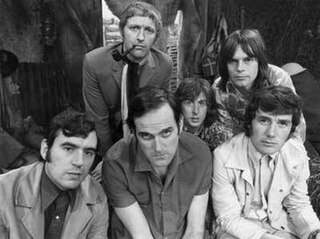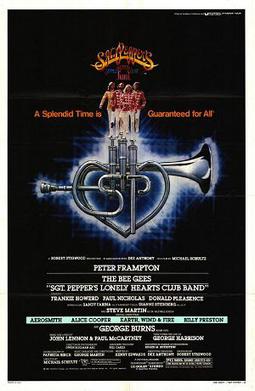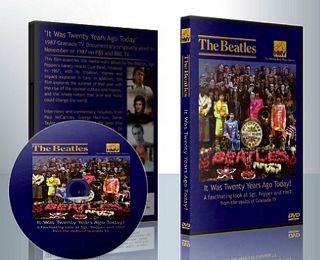Related Research Articles

Monty Python were a British comedy troupe formed in 1969 consisting of Graham Chapman, John Cleese, Terry Gilliam, Eric Idle, Terry Jones, and Michael Palin. The group came to prominence for the sketch comedy series Monty Python's Flying Circus, which aired on the BBC from 1969 to 1974. Their work then developed into a larger collection that included live shows, films, albums, books, and musicals; their influence on comedy has been compared to the Beatles' influence on music. Their sketch show has been called "an important moment in the evolution of television comedy".

The Sex Pistols were an English punk rock band formed in London in 1975. Although their initial career lasted just two and a half years, they became one of the most culturally influential acts in popular music. The band initiated the punk movement in the United Kingdom and inspired many later punk, post-punk and alternative rock musicians, while their clothing and hairstyles were a significant influence on the early punk image.
Art rock is a subgenre of rock music that generally reflects a challenging or avant-garde approach to rock, or which makes use of modernist, experimental, or unconventional elements. Art rock aspires to elevate rock from entertainment to an artistic statement, opting for a more experimental and conceptual outlook on music. Influences may be drawn from genres such as experimental music, avant-garde music, classical music, and jazz.

Sgt. Pepper's Lonely Hearts Club Band is the eighth studio album by the English rock band the Beatles. Released on 26 May 1967, Sgt. Pepper is regarded by musicologists as an early concept album that advanced the roles of sound composition, extended form, psychedelic imagery, record sleeves, and the producer in popular music. The album had an immediate cross-generational impact and was associated with numerous touchstones of the era's youth culture, such as fashion, drugs, mysticism, and a sense of optimism and empowerment. Critics lauded the album for its innovations in songwriting, production and graphic design, for bridging a cultural divide between popular music and high art, and for reflecting the interests of contemporary youth and the counterculture.

"Lucy in the Sky with Diamonds" is a song by the English rock band the Beatles from their 1967 album Sgt. Pepper's Lonely Hearts Club Band. It was written primarily by John Lennon with assistance from Paul McCartney, and credited to the Lennon–McCartney songwriting partnership. Lennon's son Julian inspired the song with a nursery school drawing that he called "Lucy – in the sky with diamonds". Shortly before the album's release, speculation arose that the first letter of each of the nouns in the title intentionally spelled "LSD", the initialism commonly used for the hallucinogenic drug lysergic acid diethylamide. Lennon repeatedly denied that he had intended it as a drug song, and attributed the song's fantastical imagery to his reading of Lewis Carroll's Alice in Wonderland books.

"With a Little Help from My Friends" is a song by the English rock band the Beatles, from their 1967 album Sgt. Pepper's Lonely Hearts Club Band. It was written by John Lennon and Paul McCartney and sung by drummer Ringo Starr, his lead vocal for the album. As the second track on the album, it segues from the applause on the title track.

John Simon Ritchie, better known by his stage name Sid Vicious, was an English musician, best known as the bassist for the punk rock band Sex Pistols.

Nancy Laura Spungen was the American girlfriend of English musician Sid Vicious and a figure of the 1970s punk rock scene.

Sid and Nancy is a 1986 British biographical film directed by Alex Cox, co-written with Abbe Wool, and starring Gary Oldman and Chloe Webb. The film portrays the life of Sid Vicious, bassist of the punk rock band the Sex Pistols, and his destructive relationship with girlfriend Nancy Spungen. The film also features supporting performances from David Hayman, Xander Berkeley, and Courtney Love.
"How Do You Sleep?" is a song by English rock musician John Lennon from his 1971 album Imagine.
"Within You Without You" is a song by the English rock band the Beatles from their 1967 album Sgt. Pepper's Lonely Hearts Club Band. Written by lead guitarist George Harrison, it was his second composition in the Indian classical style, after "Love You To", and inspired by his stay in India in late 1966 with his mentor and sitar teacher Ravi Shankar. Recorded in London without the other Beatles, it features Indian instrumentation such as sitar, tambura, dilruba and tabla, and was performed by Harrison and members of the Asian Music Circle. The recording marked a significant departure from the Beatles' previous work; musically, it evokes the Indian devotional tradition, while the overtly spiritual quality of the lyrics reflects Harrison's absorption in Hindu philosophy and the teachings of the Vedas.

Sgt. Pepper's Lonely Hearts Club Band is a 1978 American jukebox musical comedy film directed by Michael Schultz, written by Henry Edwards and starring an ensemble cast led by Peter Frampton and the Bee Gees. Depicting the loosely constructed story of a band as they wrangle with the music industry and battle evil forces bent on stealing their instruments and corrupting their hometown of Heartland, the film is presented in a form similar to that of a rock opera, with the songs providing "dialogue" to carry the story. George Burns has most of the spoken lines that act to clarify the plot and provide further narration but there are a few other lines throughout the movie.

"Sgt. Pepper's Lonely Hearts Club Band" is a song written by Paul McCartney, credited to Lennon–McCartney, released in 1967 on the album of the same name by the Beatles. The song appears twice on the album: as the opening track, and as "Sgt. Pepper's Lonely Hearts Club Band (Reprise)", the penultimate track. As the title song, the lyrics introduce the fictional band that performs on the album.

"Lovely Rita" is a song by the English rock band the Beatles from their 1967 album Sgt. Pepper's Lonely Hearts Club Band. It was written mainly by Paul McCartney and credited to Lennon–McCartney. It is about a meter maid and the narrator's affection for her.
"The 500 Greatest Albums of All Time" is a recurring opinion survey and music ranking of the finest albums in history, compiled by the American magazine Rolling Stone. It is based on weighted votes from selected musicians, critics, and industry figures. The first list was published in a special issue of the magazine in 2003 and a related book in 2005.

Martin Neil Lewis is a US-based English humorist, writer, radio/TV host, producer, and marketing strategist. He is known for his participation in a variety of projects in the arts and entertainment worlds including his work as the co-creator and co-producer of the Secret Policeman's Balls benefit shows for Amnesty International and as a comedic performer and writer on American TV. He hosts his own daily radio show, heard in America on Sirius Satellite Radio and worldwide on Sirius Internet Radio. He is an occasional contributor to The Huffington Post website.

Monty Python: Almost the Truth is a 2009 television documentary series in six parts that covers 40 years of the surreal comedy group Monty Python, from Flying Circus to present day projects such as the musical Spamalot. The series highlights their childhood, schooling and university life, and pre-Python work. The series featured new interviews with surviving members John Cleese, Terry Gilliam, Eric Idle, Terry Jones and Michael Palin, alongside archive interview footage of Graham Chapman and interviews with several associates of the Pythons, including Carol Cleveland, Neil Innes and Chapman's partner David Sherlock, along with commentary from modern comedians.

Who Killed Nancy? is a British documentary film directed by Alan G. Parker. The film was produced by Ben Timlett and Christine Alderson. It had its US theatrical opening at the Cinema Village in New York City on 30 July 2010. The film examines the possibility that it was not Sid Vicious who was responsible for the death of Nancy Spungen.

It Was Twenty Years Ago Today is a 1987 British-made television documentary film about the 1967 Summer of Love. It premiered on 1 June 1987, twenty years after the official release date of the Beatles' album Sgt. Pepper's Lonely Hearts Club Band, and presents the album as the central factor behind the events and scenes that led to the full emergence of the 1960s counterculture.
References
- 1 2 3 Kaley, Jason (23 July 2018). "INTERVIEW: My long and winding road with rock stars". Lancashire Telegraph .
- ↑ Catsoulis, Jeannette (29 July 2010). "Alan G. Parker Revisits Sid Vicious's Worst Moment". The New York Times. ISSN 0362-4331 . Retrieved 6 December 2022.
- ↑ "Monty Python reunite to tell life stories". www.telegraph.co.uk. Retrieved 6 December 2022.
- ↑ "BBC Programme Index". genome.ch.bbc.co.uk. Retrieved 6 December 2022.
- ↑ Dalton, Stephen (15 May 2017). "'It Was Fifty Years Ago Today! The Beatles: Sgt. Pepper and Beyond': Film Review". The Hollywood Reporter. Retrieved 6 December 2022.
- ↑ "Status Quo Will Reunite After 25 Years to Celebrate the Release of Hello Quo - the Definitive Documentary on the Rock Band | the Fan Carpet".
- ↑ Goodman, Tim (15 December 2010). "Rebel truce: the history of the clash: there's plenty to enjoy for fans, but the punk legends deserve a more thorough doc". Hollywood Reporter – via Gale General OneFile.